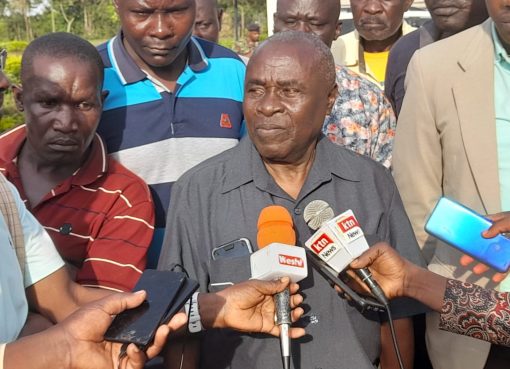Ripple Effect, a Non-Governmental Organization in partnership with World Bicycle Relief has donated 100 bicycles to farmers in Kimaeti sub-county, Bungoma County to escalate extension services and boost food production.
Speaking during the handover ceremony witnessed by Ministry of Agriculture and Livestock officials, Director of Ripple Effect Mr. Titus Sagala observed that poverty has been a major challenge in remote areas hence their quest to curb cases of food shortage by mobilizing farmers to spur food production and sustain families.
Sagala acknowledged that this move will ease the work of agricultural extension workers and farmers who have been trained in extension work.
Sagala disclosed that each bicycle cost Sh 22,000 adding that the selected farmers receiving the bicycles were trained and will in turn spread what they have learnt to the community to increase farm production.
Sagala noted that thirty-five per cent of the Kenyan population still lives below the international poverty line.
“We want to see a Kenya full of life and joy, where families do more than simply survive. We want to see them really live. We want to see children go to school, people follow their dreams, and poverty becomes a distant memory,” he said.
“As agriculture employs a large percentage of our population, contributing 25-30 per cent of GDP, the economy is highly vulnerable to climate variability. We are highly dependent on climate-sensitive sectors including agriculture, water, energy, forestry and tourism,” he said.
Noting that Ripple Effect Kenya works with communities to regenerate and protect their natural environment as well as build resilience to climate change risks, Sagala urged the community not to cut down trees without replacement.
Ripple Effect Kenya also works to enable communities to access safe water through community initiatives that establish water user committees and protect springs.
However, he said that poverty has been a major challenge in remote areas and it is in regard to this that they are fighting to curb cases of food shortage to sustain families.
“There remains a high level of poverty and exclusion despite a decline in our country’s poverty rate, with a concentration of economic power among the rich,” he pointed out.
He stated that with poverty rates remaining above 70 per cent, people are excluded from opportunities on account of gender, disability, or ethnicity and if not addressed, this inequality will result in over 2.9 million more people living in extreme poverty in the next five years.
Bumula Deputy County Commissioner Christine Eredi who graced the occasion said that farmers who have got an opportunity to be trained should spread the skills to other farmers, adding that the way to better our society is through Public-Private partnerships.
She advised farmers not to depend on rain but make use of the water from rivers to water their crops to sustain production.
By Roseland Lumwamu





